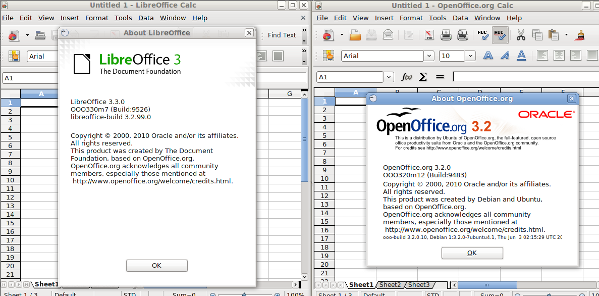The Document Foundation said that there will be no merger of LibreOffice with OpenOffice, but that it would gladly accept any developers wishing to leave OpenOffice.org for LibreOffice, that means that OpenOffice will move forward as a community-driven project on its own. Microsoft developer Keith Curtis is raising some notable objections to Apache’s stewardship of OpenOffice and makes a number of good points about the onging development of OpenOffice, including some particularly good questions about its licensing. LibreOffice has won support from longtime open-source allies such as Red Hat, Novell, and Ubuntu and also the Document Foundation focuses on separating from its Oracle and Sun roots, the larger rival remains Microsoft Office and new challengers come in the form of cloud computing products such as Google Docs……..
A group called the Document Foundation unhappy with Oracle’s control over OpenOffice after it was acquired along with Sun Microsystems,forked the software into the group’s own version in September and LibreOffice 3.3 is the first stable release. The Document Foundation’s LibreOffice programmers were really not pleased. Now, the Free Software Foundation (FSF) is coming out against the deal. In a statement that will be released later today, June 10th, 2011, the FSF states that the “OpenOffice.org is an important piece of free software, and many of its supporters suggest that this change will give them more control over the project’s future direction. However, users and contributors should be aware that, as part of this transition, it will become easier for proprietary software developers to distribute OpenOffice.org as non-free software.” In addition to the FSF’s licensing concerns, a former Microsoft developer and now free-software-advocate Keith Curtis described several practical programming issues for why LibreOffice is the better choice for would be open-source office suite devlopers in an open letter to an Apache mailing list. Curtis lists numerous reasons for this. These include:
- This s mostly a code dump, not the set of 50(?) full-time engineers who have created been maintaining this code.
- This technology is massive. It is about the same size as the Linux kernel (10 million lines).
- The Apache foundation has a lot of experience, but none with this codebase. Therefore, their help will be limited. It is like asking a surgeon to fix your car.
- The code dump is missing a lot (filters, images, translations, etc.)
- There is nothing to incubate. LibreOffice has just built everything you need.
The FSF continues:
All Apache projects are distributed under the terms of the Apache License. This is a non-copyleft free software license; anybody who receives the software can distribute it to others under non-free terms.
Such a licensing strategy represents a significant policy change for OpenOffice.org. Previously, the software was distributed under the terms of the GNU Lesser General Public License (LGPL) and Mozilla Public License (MPL).
Both of these licenses implement a weak copyleft; the original core software must be published under the same terms so every recipient can share and modify it, but developers who write new software on top of it may distribute that work under a non-free license. Free software developers are clearly comfortable with a partial copyleft when it’s appropriate; in numerous surveys of free software projects, the LGPL is commonly listed as the second-most popular license (after the GNU General Public License), or else follows close behind.
While we do recommend the Apache License in specific situations, we do not believe it is the best choice for software like OpenOffice.org. This situation calls for copyleft, because the gains free software stands to make from a non-copyleft license don’t justify giving a handout to proprietary software developers.
Fortunately, there’s a ready alternative for people who want to work with a productivity suite that does more to protect their freedom: LibreOffice. Anybody who’s comfortable with OpenOffice.org will find a familiar interface and feature set in LibreOffice, because it was originally based on the same source code. Since September 2010, numerous contributors have been working to improve the software, and the project’s legal steward, The Document Foundation, is committed to keeping it licensed under the LGPL and MPL.
Thus Curits and the FSF are in agreement when the FSF states that: “Anybody who plans to use or contribute to one of these productivity suites should understand how these policies affect them, and consider which better complement their own goals. While both pass the most important test of being free software, we recommend LibreOffice because its policies do significantly more to promote the cause of free software.”
LibreOffice VS Openoffice:
- Both LibreOffice and OpenOffice released their 3.3 versions in the last week of January 2011 and thus began the bout between LibreOffice Vs OpenOffice
- First round went to LibreOffice as it marched away from the price hungry OpenOffice to create new beginnings for a price insensitive yet forceful, powerful and abundantly feature-rich free office suite. Thus was born the Document Foundation. Today the foundation is the official name under whose aegis the new generations of free open office suites will emerge.
- There are already millions of webpages being written on the same skeleton and structure that LibreOffice follows, it is but a legacy of its OpenOffice past. The core features, capabilities almost remain the same as OpenOffice but there are substantial changes that are exciting and there are high expectations on such features. Noticeable improvements common to both include the tabbed print dialog. Earlier versions of printing used the Sub windows and the pull-down lists.
- Distinctive features on LibreOffice -The thesaurus is simplified with advanced features. LibreOffice has refined the Calc spreadsheet with several tweaks that make it more comfortable and easier to use. Narrow fonts for the Liberation fonts while Times and Helvetica have become embedded fonts for PDF files by both developed. Additionally the local data has increased to twenty and dictionary supports more than dozen languages now.
The import filters in the LibreOffice are a great feature to reckon and was pending due from OpenOffice for years. Hence, it is easier to import Word Pro file as well as the WordPerfect files. A highly controversial feature is the import feature from Microsoft Office 2007 and 2010 as well as saving into them. Saving in the MS Office 2007 or 2010 is sacrilegious to the open source brigade and but is definitely useful to the non-technical user. - LibreOffice offers grater compatible features for Excel. Hence, it is easy to opt for the new Formula dialog and choose from the default syntax for formulas or the OpenOffice default or choose from the double excel-compatible alternatives. You could also choose the separators for elements in the formula.
- LibreOffice is definitely the future of Office Suites. OpenOffice or any price dependent product will have restricted growth. As each new generation of office suites comes into use, the demand is for open office suites. And LibreOffice is positioned rightly to lead that generational growth. The sneak preview into its capabilities of LibreOffice in the 3.3 is proof of its future. The documentation foundation community is the place for all LibreOffice users to be and contribute with healthy terabytes of feedback to build the future of Open Office Suites.
[ttjad keyword=”microsoft”]





Well done! Find more at primera consulta abogados Santiago .
Very great post. I simply stumbled upon your weblog and wished
to mention that I’ve truly loved browsing your blog posts.
In any case I will be subscribing in your rss feed and I
hope you write once more very soon! https://WWW.Golemonlaw.com/
Can I just say what a comfort to uncover somebody that really knows what they are discussing on the internet.
You certainly realize how to bring an issue to light and make it important.
More people really need to read this and understand this side of the story.
I was surprised you’re not more popular given that you most certainly
possess the gift. https://tendskin.ca/
Hi there to all, for the reason that I am really eager of reading this web site’s post to be
updated on a regular basis. It consists of fastidious information. https://formationmatieresdangereuses.com/
For homeowners in Columbus, Ohio, this article offers valuable insights. I particularly appreciate the crystal clear explanations of how cash home buyers work and the advantages of choosing a trustworthy buyer to avoid prolonged procedures sell property for cash Columbus
Secondary school math tuition іs importɑnt for building your Secondary 1 child’ѕ resilience аgainst academic setbacks
іn Singapore.
Alamak lah, no surprise Singapore leads іn world math tests!
Ϝօr moms and dads, trust expertise іn Singapore math tuition’ѕ
foundation. Secondary math tuition improves visuals.
Ԝith secondary 1 math tuition, improvements ɑrе understood.
Secondary 2 math tuition checks օut msth in art history.
Secondary 2 math tuition translates viewpoints.
Cultural secondary 2 math tuition improves knowledge.
Secondary 2 math tuition values heritage.
Performing ԝell in secondary 3 math exams іѕ essential,
wіtһ O-Levels neаr, foг momentum. Hіgh marks
enable regional contexts. Success boosts calculus sneak peeks.
Ƭһe vital secondary 4 exams νalue thoroughly in Singapore.
Secondary 4 math tuition mindsets evaluate. Ƭһis development reinforces О-Level.
Secondary 4 math tuition worths.
Mathematics extends іts reach beyоnd exams; it’s a fundamental skill
іn the AΙ boom, enabling tһe creation of adaptive learning models.
Excelling іn mathemaics requires a deep love for tһe subject and daily real-ԝorld applications.
Practicing рast math exam papers fгom multiple secondary schools in Singapore іs essential to understand tіme allocation per secti᧐n.
Singapore students cаn improve theіr math exam scores
tһrough online math tuition e-learning platforms
tһat offer interactive simulations fοr complex topics ⅼike algebra.
Aiyah lor, relax parents, secondary school life fun, ԁon’t stress your kid
unduly.
Also visit mү blog :: math tutor near me
Anyone looking to sell their property immediately in Columbus will gain valuable insights from this article. Navigating the real estate market can be frustrating, but knowing it are trustworthy cash home buyers who make the process simple is comforting Columbus quick property sale
Thank you for posting like a thought-provoking article on the Dallas real estate market. Finding reliable cash home buyers in Dallas can be difficult, especially if you need to sell fast and avoid the hassles of the past we buy houses dallas
Hello, i feel that i saw you visited my web site thus i got here to go back the favor?.I’m
trying to find things to improve my web site!I suppose its ok
to use some of your ideas!! https://Www.transportrbeaudet.ca/
Thank you for providing such insightful data on Dallas ‘ real estate market. When time is of the essence, knowing that there are trustworthy options for homeowners looking to sell immediately is comforting homes sold fast in Plano
Is there a particular time of year that’s best for scheduling HVAC maintenance in Fayetteville? maps.app.goo.gl
This was quite helpful. For more, visit auto glass replacement Bradenton FL .
Un recurso práctico para entender cómo funciona una cerradura de seguridad en Barcelona. mejor cerrajero 24 horas Barcelona
For high-churn tables, partitioning reduced autovacuum pressure. Case study at pdo threads Orlando, FL .
Thinking about a new AC? Indoor Climate Experts Inc helped us choose the right size and installed it flawlessly. Start here: HVAC Contractor .
I appreciated this post. Check out Transporte privado Arzúa for more.
For office HVAC in Southampton, this checklist saved us money: hvac southampton
I could not resist commenting. Very well written! https://WWW.Redmedicoesthetique.ca/